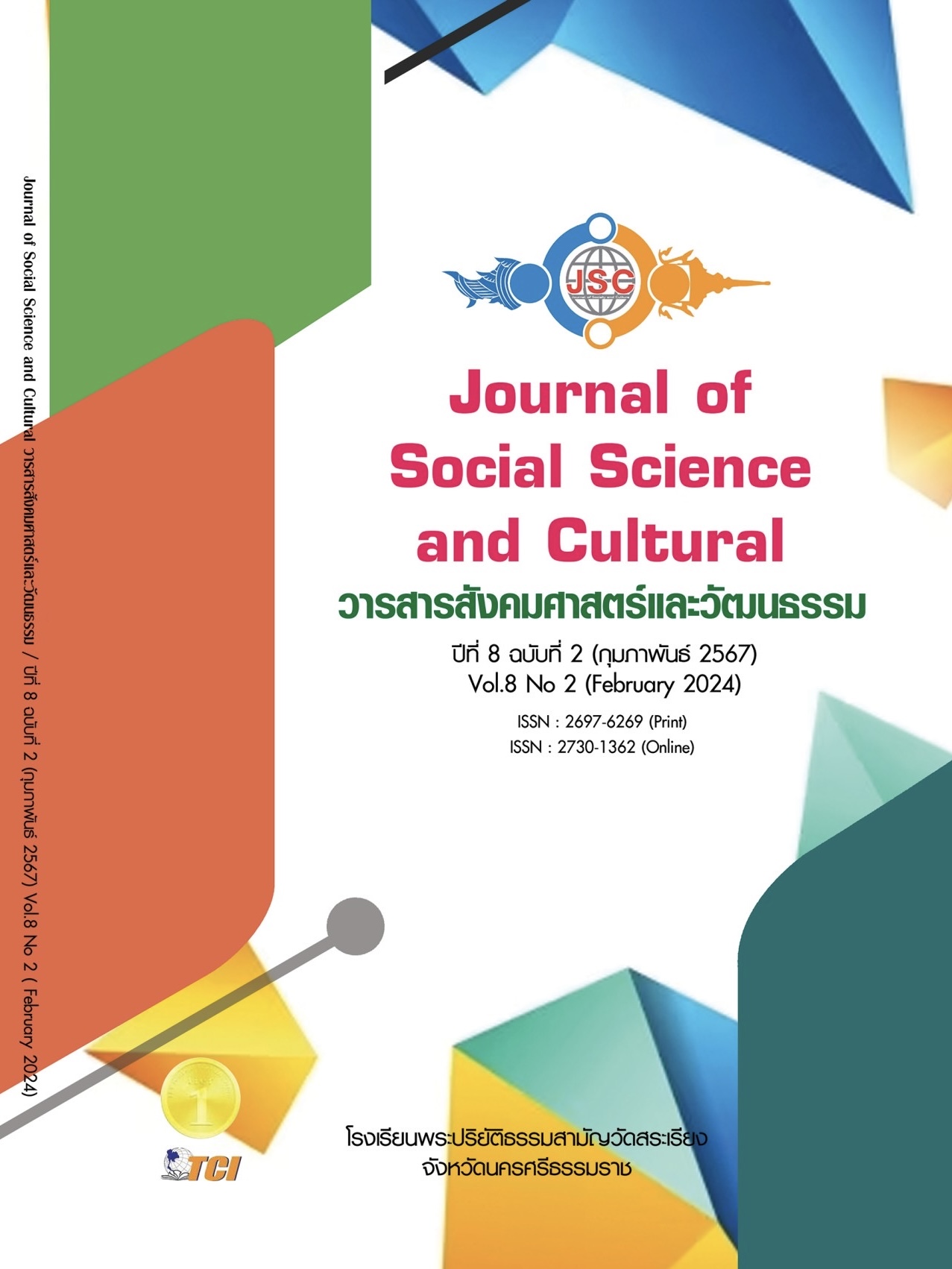DEVELOPMENT OF A PROGRAM FOR ENHANCING OPENNESS TO EXPERIENCE OF UNDERGRADUATE STUDENTS BASED ON MENTAL TOUGHNESS AND THEORY OF PLANNED BEHAVIOR
Main Article Content
Abstract
The purpose of this research article was to develop a program to promote the employability of graduate students based on the concept of psychological strength and behavioral theory principles, and evaluate the quality of the program as follows: 1) Studying and analyzing basic data for program development and determining the components of the program to promote employability, and 2) Developing and evaluating the quality of the program to promote employability. The qualified individuals involved in the research include 5 qualified professionals in curriculum development, psychology, research, and educational evaluation. The research tools used include an assessment questionnaire to measure the accuracy and appropriateness of the program, data analysis using mean and standard deviation, and assessment of program component congruence (IOC) analysis. The research found that the program to promote employability consisted of 7 components: 1) Principles, 2) Specific objectives, 3) Content, and 4) Program steps, which included assessing existing beliefs, reinforcing new beliefs, preparing for goals, expanding diverse life experiences, and achieving success, 5) Structure and learning activities in the program, 6) Program learning management approach, and 7) Measurement and evaluation methods. The quality assessment results from the qualified individuals found that the program to promote employability was highly suitable ( = 4.86, SD. = 0.19). The data analysis from the qualified individuals and the experimental implementation found that the program was effective in helping students develop themselves for employability by increasing flexibility in the duration of learning activities and providing appropriate trainers to facilitate the program's activities.
Article Details
References
กองแผนงาน มหาวิทยาลัยสงขลานครินทร์. (2561). ความพึงพอใจของนายจ้าง/ผู้ใช้บัณฑิต ปีการศึกษา 2562. เรียกใช้เมื่อ 11 กุมภาพันธ์ 2563 จาก https://natres. psu.ac.th/office/plan/doc/2564/TQF_JOB62.pdf.
กิตติศักดิ์ กอร้อย. (2550). พฤติกรรมการทำงานเป็นทีมของนิสิตปริญญาตรีภาคปกติมหาวิทยาลัยศรีนครินทรวิโรฒ. ใน วิทยานิพนธ์การศึกษามหาบัณฑิต สาขาวิชาการอุดมศึกษา. มหาวิทยาลัยศรีนครินทรวิโรฒ.
นฤนาท จั่นกล้า. (2558). การศึกษาผลสัมฤทธิ์ทางการเรียนและพฤติกรรมการทำงานกลุ่ม เรื่องคอนกรูเอนซ์สำหรับนักศึกษา มหาวิทยาลัยราชภัฏพระนครศรีอยุธยาที่เรียนโดยใช้การเรียนแบบร่วมมือ. วารสารวิจัยราชภัฏพระนคร สาขามนุษยศาสตร์และสังคมศาสตร์, 10(1), 76-88.
วิดาพร ทับทิมศรี และคณะ. (2562). คุณลักษณะบัณฑิตที่พึงประสงค์ตามกรอบมาตรฐานคุณวุฒิระดับอุดมศึกษาแห่งชาติ และอัตลักษณ์ของผู้สำเร็จการศึกษาหลักสูตรพยาบาลศาสตรบัณฑิต วิทยาลัยพยาบาลบรมราชชนนี กรุงเทพ ตามความคิดเห็นของผู้ใช้บัณฑิต. วารสารวิทยาลัยพยาบาลบรมราชชนนี กรุงเทพมหานคร, 35(1), 252-263.
Ajzen, I. (2015). The theory of planned behaviour is alive and well, and not ready to retire: a commentary on Sniehotta, Presseau, and Araújo-Soares. Health psychology review, 9(2), 131-137.
Cefai, C., et al. (2018). Strengthening social and emotional education as a core curricular areaacross the European Union. European Union: A review of the international evidence.
Chernyshenko, O. S., et al. (2018). Social and emotional skills for student success and well-being, OECD Publishing, Paris. Retrieved Jan 4, 2022, from dx.doi.org/10.1787/db1d8e59-en.
Cherry, K. (2020). The Benefits of Being Open-Minded. HOLISTIC HEALTH. Retrieved Jan 4, 2022, from https://www.verywellmind.com/be-more-open-minded-4690673
Clough, P. & Strycharczyk, D. (2015). Developing mental toughness: Coaching strategies to improve performance, resilience and wellbeing. London: Kogan Page Publishers.
Clough, P. & Strycharczyk, D. (2018). Mental toughness and its role in the development of young people In Coaching in Education. Oxfordshire: Routledge.
Cowden, R. G., et al. (2017). Mental toughness in South African youth: Relationships with forgivingness and attitudes towards risk. Psychological reports, 120(2), 271-289.
Kankaraš, M. & Suarez-Alvarez, J. (2019). Assessment framework of the OECD Study on Social and Emotional Skills. Paris: OECD Publishing.
OECD. (2017). Social and Emotional Skills: Well-being, Connectedness and Success OECD Publishing, Paris. Retrieved Jan 4, 2022, from https://www.cfchildren.org/wp-content/ uploads/research/oecd-social-and-emotional-skills-well-being-connectedness-and-success_compressed.pdf
Stamp, E. et al. (2015). Relationships between mental toughness and psychological wellbeing in undergraduate students. Personality and Individual Differences, 75(2015), 170-174.
Stevenson, H. et al. (2014). IB Middle Years Programme in the UK: Implementation and practices and student outcomes associated with the learner profile attribute'open minded'. Retrieved Jan 4, 2022, from https://ibo.org/globalassets/new-structure/research/pdfs/openminded-report-en.pdf
Strycharczyk, D. & Clough, P. (2018). Developing mental toughness in young people: Approaches to achievement, well-being, employability, and positive behaviour. Oxfordshire: Routledge.
Sutter, N. & Paulson, S. (2017). Predicting college students' intention to graduate: a test of the theory of planned behavior. College Student Journal, 50(3), 409-421.
Wu, A. M. & Tang, C. S. K. (2012). Problem gambling of Chinese college students: Application of the theory of planned behavior. Journal of Gambling Studies, 28(2), 315-324.


